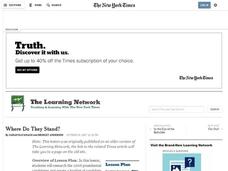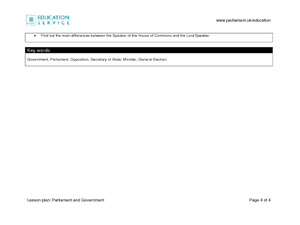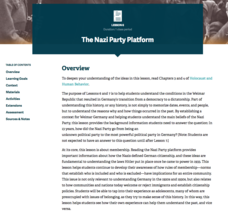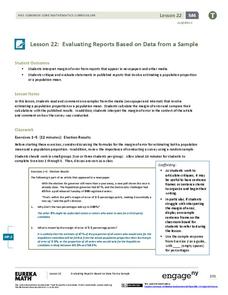Curated OER
Ballots
In this history worksheet, students utilize individual ballots to vote in a mock election/classroom election throughout the year as needed.
Curated OER
Voices: Voting Rights
Students examine the history of the right to vote in the United States. In this civics lesson plan, students research steps taken during the Civil Rights Movement to secure the rights of African Americans to vote.
Curated OER
Where Do They Stand?
In this presidential election worksheet, students research the 2008 presidential candidates and create a booklet of candidate profiles that clearly differentiate each one. They also assume the identity of one of the candidates and hold a...
Curated OER
Donkeys and Elephants and Voters, Oh My!
Students celebrate party politics. In this American politics lesson, students discover what the 2 main political parties in the country are and discuss their functions. Students then participate in a classroom simulation that requires...
Curated OER
Citizens of the Future
Young sociologists explore how local, state, and federal governments work. This very impressive and ambitious lesson requires pupils to contact government officials who represent them and their families. They research elections, and hold...
Curated OER
Parliament and Government
Students examine the roles of those in Parliament. In this British government lesson, students participate in a mock election and conduct research regarding the difference between Parliament and government.
Curated OER
Time for Change? A look at Canada's electoral system.
Tenth graders cultivate respect and appreciation for Canadian Parliamentary democracy. They build curiosity and interest in studying citizenship issues related to Parliament and by engaging in a mock election.
Facing History and Ourselves
The Nazi Party Platform
Not all party platforms stay democratic. A resource covers many political issues in Germany during the time of World War II, and teaches pupils about the Nazi party platform and what went wrong. Individuals participate in a warm-up...
Curated OER
Voting Ballot
In this voting process worksheet, students use the ballots to vote in a mock election or classroom election. Students may write the candidate names or initiatives in the blanks.
Curated OER
Proportional Representation: A Fairer Voting System?
Tenth graders work as a grade to conduct a mock election. They tally votes in two different systems and discuss if proportional representation or straight counting of votes leads to a fairer outcome.
Curated OER
Government and Parliament
Twelfth graders discover how the government works in the United Kingdom and the functions of the Parliament. They hold a mock election and campaign.
Curated OER
Taking Poll Information
Students investigate the election and poll surveys. In this statistics lesson, students take poll information and analyze the data. They graph their data and make predictions and conjectures.
Curated OER
Political Parties and Scandal
Learners take part in a group assignment in which each group creates their own party, develops a party platform based on several meaningful issues with which our country is currently faced, and sell their party's message to the rest of...
Curated OER
A Tale of Two Wars
Young scholars create Venn diagrams comparing and contrasting the Vietnam and Iraq wars. They write informed letters to their senators expressing their opinions and possible solutions to the war. They also create mock bumper stickers...
Curated OER
Our Constitutional Connection Lesson 3: To Vote Or Not To Vote? That is the Question!
Students design colorful posters to "get out and vote" after studying the three amendments to the US Constitution that extend voting rights. They analyze the importance of voting to a healthy democracy.
Curated OER
The Great Debate
Students watch tapes of televised presidential debates dating from 1960. They analyze debates and participate in mock debates.
Curated OER
The President's Cabinet: Choosing the Right Person for the Job
Students examine the Federal Confirmation Process for filling cabinet members by completing a confirmation process flow chart. They research the process, and participate in a mock Confirmation Process.
Curated OER
So You Want to Be President?
Students examine the qualities needed to become President. In this political science lesson, students read the book So You Want to Be President? and answer questions based on the text. Students discuss if they have the qualities...
EngageNY
Evaluating Reports Based on Data from a Sample
Statistics can be manipulated to say what you want them to say. Teach your classes to be wise consumers and sort through the bias in those reports. Young statisticians study different statistical reports and analyze them for misleading...
Curated OER
What is Suffrage? Understanding the Right to Vote
Students discover one of the restrictions forced on women of the early 1900s. In this civil rights lesson, students investigate suffrage and why women were not allowed to vote in the early twentieth century. Students create a mock...
Curated OER
What's the most important issue?
High schoolers identify and compare/contrast a variety of key issues in the UK to issues in their own lives right now. They list the major issues in front of the UK people then and now. In addition, they argue the pros and cons to...
Curated OER
Gender Shouldn't Limit You!
Students examine political gender biases. In this Teaching Tolerance instructional activity, students participate in a mock classroom election which requires them to vote for a boy or a girl. Students discuss the election results and...
Curated OER
To Vote or Not to Vote? that is the Question!
Learners examine voting rights provided by the United States Constitution. In this voting lesson, students focus on 3 amendments that extended voting rights to all citizens. Learners discuss the importance of expressing opinions through...
Curated OER
Could the Civil War Been Avoided Through Compromise?
Students determine whether the American Civil War could have been avoided. In this Civil War instructional activity, students examine primary and secondary sources to prepare to participate in a classroom debate that requires them to...




